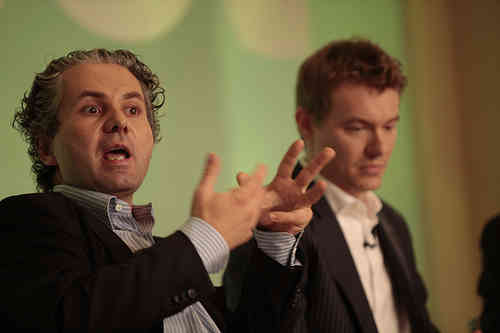
Is there such thing as a free lunch? Chris Anderson’s book says yes, when the food just drives more drink purchases – and many digital operators agree that a complementary, free/paid approach is the route ahead…
“No-one will ever make a pure free service pay – it’s only a way of attracting consumers … then upgrading them,” Omnifone CEO Rob Lewis – whose company powers Vodafone’s £1.99-a-week MusicStation, SonyEricsson’s PlayNowPlus bundled music initiative and BSkyB’s new Sky Songs offering – told Free Content – Beat It Or Join It?, a panel I moderated at the UK government’s C&binet forum on Tuesday.
“The one thing we can guarantee is, if we can create a better user experience that’s all-encompassing, that works everywhere … we’ll have the vast majority of the market adopting these paid-for service, following a free, entry-level service – rather than the situation we have today, which is 85 percent of consumers have never done anything digital at all.”
But Spotify UK MD Paul Brown told the panel free can be used for more than just luring paying customers: “There is a revenue model there (in free); it’s not on its own a model (but) advertising has value because you’re monetising attention, a very proven model in broadcast – there’s absolutely money to be made, it’s a £4.5 billion category just in (digital) display advertising.”
Yet Brown advocated free alongside other premium streams. Spotify offers mobility at a price and will take commission from affiliate download sales partners. “We all get caught up asking ‘What is the model for this industry?”,” Brown said. “It’s all of it, it’s holistic.”
Anderson’s book posits a sweet-spot for freemium services of converting five percent of their users to paid. “I’d like it to be a bit higher than that,” Spotify’s Brown said. His company is on-record as having so far converted fewer than 10 percent of its users to paid.
Social games firm Playfish’s CEO Kristian Segerstrale advocated gathering a free audience, then selling them emotional experiences and social status. This Valentine Week, Segerstrale said, Playfish sold four million virtual online flower bouquets, sent between online friends, each costing $0.05 and $2.50. That’s a cool $200,000 at minimum – from items that don’t event exist.
Segerstrale’s wisdom on how to sell intangible content was well received by delegates – rather than price all units of Robbie Williams’ forthcoming album at £10, instead charge the minority of die-hard fans £1,000 for special Robbie content, Segerstrale told ie:music founder Tim Clark, a fellow panelist who is Williams’ manager.
But Clark, who blamed the music business for, 10 years after illegal Napster blew the industry open, failing to find a new model, was also concerned with how consumers discover his artists in the first place. “The name ‘Robbie Williams’ in (Google) search,” Clark said. “Do we get a penny piece for that? Should we? Maybe.”
Isn’t Google (NSDQ: GOOG) doing Clark a favour by pushing traffic to Robbie? “Not particularly,” Clark said. “Because it doesn’t necessarily lead to his website, it can lead to all sorts of places, to YouTube; isn’t Google benefitting from all that search traffic?”